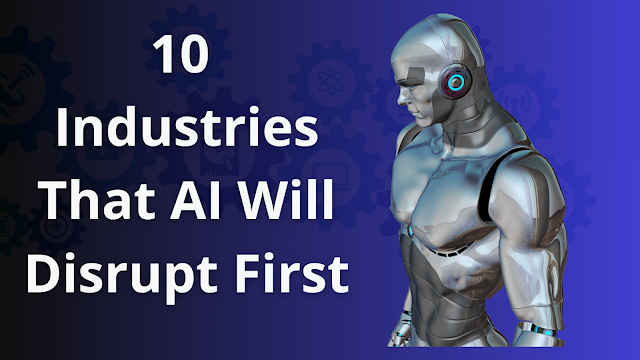Artificial intelligence (AI) is poised to replace the equivalent of 300 million full-time jobs, with certain industries likely to experience significant disruption first. In this blog, we'll explore how AI is impacting different sectors, from creative fields to tech jobs, and what this means for the future of work.
1. Creative Jobs
Surprisingly, creative roles are among the first to be impacted. AI image generators can produce photorealistic images in under two minutes, surpassing the capabilities of many inexperienced graphic designers. Tools using generative fill can seamlessly insert objects into images within seconds and even replace clothing on people. Motion graphics and CGI artists might face job losses as AI-generated video clips become photo realistic and can last over a minute. Even music composers could see reduced opportunities, as AI can automate the creation of music and melodies. Creative artists who embrace AI tools may thrive initially, but eventually, even top human artists will feel the effects of AI's rise.
2. Customer Service Jobs
Customer service representatives are at high risk of job displacement. AI can handle customer interactions using voices indistinguishable from humans, operating 24/7 without breaks. A single AI could manage hundreds of call center roles simultaneously, accessing vast databases to answer queries and provide personalized recommendations. Hotel receptionists and similar roles could also be replaced by friendly robots or AI avatars on screens, making the need for human customer service increasingly obsolete.
3. Tech Jobs
In corporate settings, positions requiring lower skill levels are most vulnerable. Data entry roles are likely to be eliminated as AI can analyze unstructured data from various sources. Junior software developers could face significant job losses due to advanced language models like ChatGPT, which can write and optimize code at an intermediate level and eventually produce entire software applications swiftly. Data and business analysts might lose opportunities as AI can create charts, graphs, and perform real-time data analysis more efficiently. Even cyber security professionals could be affected as AI develops predictive models to detect threats. However, IT professionals who build these AI systems might remain safe for a while.
4. Finance Jobs
AI could soon offer superior financial advice compared to human planners. Specialized language models trained on financial data could manage portfolios, suggest investments, and adjust stock holdings based on performance predictions. AI could also dominate investment banking, assisting in informed decisions regarding mergers, acquisitions, and investments.
5. Sales & Marketing Jobs
AI could automate personalized marketing messages, developing entire email campaigns, determining optimal send times, segmenting audiences, and crafting compelling subject lines to boost engagement and conversion rates. Sales chat bots could guide customers through purchasing processes, and AI could tailor advertisements based on demographics, beliefs, and values, enhancing personalized marketing strategies.
6. Legal Jobs
Legal assistants are among the first to be replaced as AI can quickly analyze legal texts, laws, and past cases. AI can review legal contracts rapidly and will improve over time. Virtual legal assistants could provide advanced legal advice, making legal services more accessible. However, humans will still be needed for court presentations, negotiations, and client interactions for the foreseeable future.
7. Proofreading and Translating Jobs
Automated editing tools have already reduced the demand for proofreaders. Translators are at high risk as real-time automated translation becomes more prevalent across text, audio, and video formats. Robots and computers could replace human translators who previously needed to be physically present with clients.
8. Media and Communications Jobs
While AI-generated writing is currently generic, this could change within 2–5 years. News writers might lose jobs as AI scans multiple sources to produce articles faster. AI is also generating promotional content, such as product descriptions, ad copy, and social media posts. Even news reporters could be replaced by photo realistic AI avatars, initially by non-traditional news outlets and eventually by mainstream organizations.
9. Accounting and Bookkeeping Jobs
Accounting departments could be drastically reduced as AI automates bookkeeping, tracking, budgeting, auditing, and forecasting. AI can handle invoices, payroll, taxes, cost-saving measures, and unusual transaction reports, eliminating the need for human involvement in most processes.
10. Manufacturing and Warehouse Jobs
Assembly line and warehouse workers are already being replaced by robots. Office workers like inventory analysts could also face job losses as inventory management software integrates AI for automation. Supply chain analysts might become less necessary as AI handles procurement, routing, analysis, and shipment decisions. However, human involvement in stakeholder meetings will still be required.
To navigate this changing landscape, it's crucial to continually learn in-demand skills and network with respected professionals who can provide new opportunities. While AI poses challenges to the traditional job market, it also offers incredible opportunities for growth and innovation. Stay proactive, keep learning, and be ready to adapt as we journey through this transformative era.
